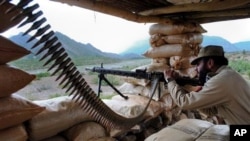The Obama administration has said it will suspend hundreds of millions of dollars in military aid and reimbursements to Pakistan. The move is widely seen as reflecting a high level of frustration in Washington with the Pakistani government. It is also a highly risky step to take against a government that is a key ally in a war.
Government-to-government disputes between friendly governments usually take place in private and are smoothed over in public. So the Obama administration’s decision to hold back some $800 million in U.S. military assistance is a highly unusual display of Washington’s diplomatic displeasure with Islamabad.
Former State Department policy planner Daniel Markey, now with the Council on Foreign Relations, says the move reflects a downward trajectory in U.S.-Pakistan relations.
"It’s definitely a sign that the relationship is spiraling downwards, and I think it’s a ratcheting up of the pressure from Washington," said Markey. "But I don’t think it’s a significant enough ratcheting up to actually turn a corner in a constructive way. If anything, it looks more like frustration and venting, which may contribute to a further spiraling downward."
Total U.S. aid to Pakistan last year came to about $4.5 billion, about half of which went to the military. Daniel Markey says the administration probably acted in anticipation of some kind of move by Congress, where sentiment to curtail aid to Pakistan has been growing.
"The U.S. has been frustrated and has felt that Pakistan has not turned a positive corner - that, if anything, relations from the Pakistani side have gotten more negative," he said. "And so I gather that in response to that - and perhaps in anticipation that the U.S. Congress would cut assistance if the administration did not - the Obama administration has decided, as they put it, to postpone the delivery of monies, some of which the Pakistanis believe they deserve because they’ve already conducted operations and used that money."
But Professor Larry Goodson of the U.S. Army War College says it is a gamble to hold back aid to Islamabad since most of the supplies for U.S. and NATO troops in Afghanistan move by land routes through Pakistan.
"It is an extremely big risk to take. In my judgment, it’s extremely dangerous to tell the person who has his hands around your throat, ‘don’t squeeze, or I’ll get really angry with you.’ The truth is, they control the supply lines," said Goodson. "And in the past, we have seen clear indicators when they have been unhappy with us, there have been attacks on the supply lines."
The U.S. has complained that Pakistan has not done enough to eradicate militant sanctuaries along the Afghan border and has demanded more cooperation from the Pakistani military and intelligence services. But U.S. officials privately voice concern about sharing intelligence with Pakistan for fear it will be leaked to militants. The Pakistani government, and in particular the powerful military, was embarrassed and upset that they were not informed in advance of the U.S. raid on a compound in the Pakistani city of Abbottabad where Osama bin Laden was found and killed.
Most recently the chairman of the U.S. Joint Chiefs of Staff, Admiral Michael Mullen, publicly implicated the Pakistani government in the kidnapping, torture, and murder of a Pakistani journalist who was critical of the intelligence service. Islamabad angrily dismissed the allegation as “baseless” and “irresponsible.”
Pakistan was a key U.S. ally in organizing and supplying the anti-Soviet resistance in Afghanistan in the 1980s, but was then subjected to some U.S. military sanctions over its nuclear program after Soviet forces withdrew. Larry Goodson says that left a lot of residual bad feeling towards the U.S. in Pakistan.
"Pakistan has this world view whereby the United States is an unreliable partner or ally and that we periodically push them to do things that they don’t want to do or whatever, and then we leave them in the lurch," he said. "That’s the narrative, right, the Pakistani narrative of the United States, and not without its justification and all that. But it nonetheless is a sort of narrative."
Goodson says the sentiment generated in Pakistan by the current military aid suspension may come back to haunt the U.S. as moves begin for a political settlement in neighboring Afghanistan, where Pakistan is expected to want to play some kind of role.
Analysts: Suspension of Aid to Pakistan Could be Risky
- By Gary Thomas














